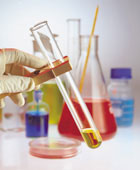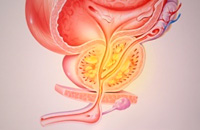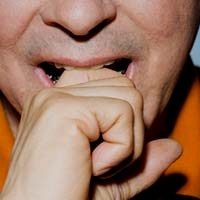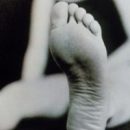Ten questions about prostatitis. What is a prostate iron how to make a diagnosis «prostatitis» And what are the methods of his treatment? Read the Answers to these and other questions.
Content

Question number 1. What is the prostate gland?
Prostate
(prostate) - an unpaired iron-muscle tip-shaped organ
About 20 cubic. cm existing only in men. She is located
directly under the bladder, completely surrounding
urethra. Prostate gland is involved in education
parts of seed liquid (sperm).
Question number 2. What is the likelihood of chronic prostatitis?
Chronic
Prostatitis is the most common male sexual disease
systems (up to 50% of men are sick of a particular form of prostatitis) and one
From the most frequent diseases in men of different ages in general, more often
relatively young (20–40 years), in connection with which the disease has
Social significance.
Incidence in cities located in
localities with low seasonal temperatures, with great
Delta and high humidity, especially large and reaches 70%.
Especially
often sinks of warm regions that moved to temporary or
Permanent place of residence in the regions with a lower average
Temperature, which is especially relevant for Moscow.
Question number 3. Presents chronic prostatitis threat to life?
Chronic
prostatitis is not a vital disease, but considering
Long, wave-like flow, possible interference of sexual function,
It has an extremely negative impact on the quality of life of patients,
Comparison with myocardial infarction.
Direct or indirectly, chronic
Prostatitis worsens interpersonal relations in the family, may cause
Serious psychological problems, including depression.
Question number 4. Does prostatitis cancer?
Prostatitis
and prostate cancer - two independent independent
Diseases. However, according to the latest research, long-term
The course of chronic prostatitis can lead to an increase
Prostate cancer disease.
For the purpose of early diagnosis
Prostate cancer After 50 years, it is advisable to study blood at a prostatospecific antigen (PSA). PSA level with prostatitis can
incognently increase, but it does not mean a cancer diagnosis.

Necessary
Conduct treatment of prostatitis and then re-explore the level of PSA.
In cases where the PSA remains elevated, the prostate biopsy is shown.
Question number 5. What are the causes of prostatitis?
Reasons
The emergence of chronic prostatitis set: infection, disorder
nervous regulation and blood circulation, supercooling, loosening local
and general immunity.
Causative agents of infectious prostatites can be
Various bacteria, viruses, chlamydia, ureaplasma, mycoplasma, mushrooms,
Trichomonas and other microorganisms, and the role of infections transmitted
Sexual way (STD) in the emergence of prostatitis recently
significantly increased.
Traditionally, prostatitis causative agents are considered
Intestinal wand, staphylococci and streptococci. main sources
Prostate infection: genital diseases in women
(Bacterial Vaginosis and DR.); oral genital or anal sex
intercourse; Infection from other foci of infection in the body.
Favorable
The background for the emergence of prostatitis are a sedentary lifestyle and
Professions related to the impact of vibration on the body (drivers
vehicles and t.D.), supercooling.
Question number 6. Can prostatitis not be associated with infection?
Highlight
Independent bacterial form of prostatitis, called also
stagnant prostatitis, in which with all clinical symptoms
Prostatitis in the secret of prostate there are no inflammatory changes and
infection. The cause of it is congestive processes in the prostate
gland and small pelvis, incomplete emptying it from the secret, overflow
blood, swelling, which leads to disorders of the contractile, secretory and
Other functions organ.
Masturbation contribute to the prostate,
sex perversions, irregular sexual life interrupted and
deliberately tightened sex acts, sexy
dissatisfaction, alcohol use and acute food, disease
rectum (hemorrhoids, cracked rear pass and other.). Sometimes stubborn
The course of prostatitis is associated with allergic and autoimmune processes.

One of the most important mechanisms for the development and maintenance of inflammation in
The prostate gland is a detrotever-sphincter dissemergia
(Violation of the regulation in the work of the muscles of the bladder and muscles,
Holding urine), developing under the above conditions. Wherein
There is a cast of urine into prostate ducts, which causes development
Chronic prostatitis.
Question number 7. What studies need to be held to confirm or eliminate chronic prostatitis?
Diagnostics
chronic prostatitis, as a rule, does not cause difficulties
urologist, but to identify the causal factor of the disease is possible
After a thorough laboratory survey with the use of all
complex of modern methods. Prostatitis can manifest itself a variety of symptoms (difficult, painful, rapid urination).
He
can also cause a feeling of heat, the pain at the bottom of the abdomen over the Lone or in
Paho, between legs in the crotch, lead to functional disorders
intercourse (decline in interest in sex, premature
Severance, weakening and / or impossibility of adequate erections,
Orgasm and T.D.), cause male infertility.
Often
Clinical symptoms of prostatitis are minor, difficult to
diagnosis and the reason for the late circulation of patients to the doctor.
SAME
An important surveys in chronic prostatitis are: finger
Rectal examination, microscopy of a prostate secret (or two-folded sample), sowing a secret of prostate with definition
antibiotic sensitivity), PCR diagnostics on the STD and
Transrectal ultrasound examination. Sometimes required
Conducting urodynamic and endoscopic studies.
Question number 8. How is chronic prostatitis?
Treatment
Chronic prostatites presents a serious problem and should be
complex, including multidirectional medicinal therapy on the background
local and sometimes general physiotherapeutic effects, medical
F Colding, which are selected individually depending on
Colding, which are selected individually depending on
clinical manifestations of the disease, patient himself. IN
In recent years, thermotherapy is increasingly used (prostate heating to
45°WITH).
The basis for the treatment of prostatites caused by infection is constituted
Antibiotics who are often accepted for several weeks
or months. In severe cases of prostatitis, hospitalization is necessary for
Intensive treatment.
Abacterial prostatites cure more difficult,
as they are not always clear their reason. Use of antibacterial
It is advisable to eliminate a possible hidden infection.
The remaining treatments are aimed at improving overall well-being:
Non-steroidal anti-inflammatory funds (ibuprofen, diclofenac,
pyroxics, naproxen); Mud, Hot Sitting Bath,
Temperature 40-45°C, B–Adrenoblays, Plant preparations,
Enzymatic agents and multivitamins.
It is impossible not to mention about
Prostate massage efficiency with chronic prostate.
This procedure refers to one of the most effective in the treatment
Chronic prostatitis.
Question number 9. Is it possible to re-get a prostatitis?
The probability of re-illness by prostatitis in patients who have undergone it is quite high. After
cessation of treatment and reception of antibiotics in cases of incomplete liquidation
infections disease can acute again. In these cases for
Prevent re-aggravation shows a long reception
Antibacterial drugs.
Abacterial prostatitis, as a rule, leaks chronically and expediently long-term treatment, including sanatorium resort.
Question number 10. What to do to prepatite not repeated?
- Observe a healthy lifestyle, diet without excess acute, irritating food, limit alcohol consumption;
- engage in physical culture and special medical physical education aimed at improving blood circulation in the organs of a small pelvis and strengthening his muscles (squats, maugh and cycling legs, the stress of the crotch sobbins by retracting the rear pass and other.), very effective yoga classes;
- carry out prevention and timely and adequate treatment of infectious diseases in other bodies (for example, to visit the dentist in a timely manner);
- carry out the prevention of stagnation in a small pelvis (liquidation of constipation and t.D.) and diseases of the rectum;
- Sports (Athletics,
swimming, skiing, skates) or therapeutic physical education, not to get involved in excessively masturbation.









